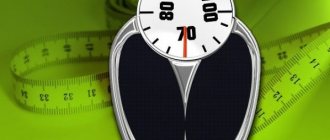Is weight gain normal?
During your period, it is normal for you to gain 2-3 kilograms. They go away a few days after menstruation stops. This is a physical symptom of premenstrual syndrome (PMS). PMS is very common. More than 90 percent of women who menstruate experience PMS. It includes a wide range of physical, emotional and behavioral symptoms. All of them affect women a few days before their period. These symptoms are caused by hormonal changes during the menstrual cycle. Let's look at a few reasons why you may gain a few pounds during your period.
Hormonal change.
Hormonal changes can lead to weight gain. Most often this occurs due to water retention. In the days leading up to your period, estrogen and progesterone decrease rapidly. This tells your body that it is time to start your period. Estrogen and progesterone also control how your body regulates fluid. When these hormones fluctuate, the tissues in your body accumulate more water. The result is water retention, or edema.
Water retention can cause swelling or swelling in the chest, abdomen, or limbs. It increases body weight, but not fat. Water retention is a common symptom of PMS. It occurs in 92 percent of women.
How long does it take to lose weight after menstruation?
Weighing yourself on the day your period starts is not recommended. During this period, the swelling has not yet gone away, so the numbers on the scales may be upsetting. Even a slight increase in weight during menstruation is acceptable, because hormonal changes continue during this period.
The indicators begin to return to normal on days 3-5 of the cycle. By 5-7 days, metabolism is normalized, accumulated water is completely removed from the body. This helps the weight stabilize.
Important! If your condition has not returned to normal on the 5th-7th day of your period, you will not be able to lose weight without changing your diet and doing additional physical activity.
Bloating
A period of bloating or abdominal cramps can make your clothes tight and uncomfortable. This is not weight gain. But you may feel like you've gained a few extra pounds. During your period, hormonal changes can increase gas in your gastrointestinal tract and cause bloating. Water retention in the stomach can also lead to bloating. Bloating can be described as a feeling of tightness in the abdomen. It can begin five days before your period and continue into the first days of your period.
How to avoid gaining weight before your period
For girls who remain overweight after each critical day, it is advisable to reconsider their lifestyle. Particular attention should be paid to phase 2 of the cycle. If you curb your appetite and do not forget about the need for moderate physical activity, then there will be no gains. Women who adhere to the following recommendations do not gain weight. Nutritionists and gynecologists advise:
- minimize the consumption of fast carbohydrates;
- refuse food, the consumption of which leads to water retention in the body: smoked meats, pickles, sausages, and other harmful foods;
- increase physical activity;
- control weight.
Nutritionists advise excluding baked goods, confectionery, and chocolate from the menu. You can provide your body with carbohydrates through cereals, fruits, vegetables, and grain bread.
Women whose weight increases before their critical days try to get rid of it with the help of grueling workouts. As a result, the body experiences stress and the need for serotonin increases. The easiest way to stimulate the production of the happiness hormone is to eat sweets. With a lack of willpower, you can get a vicious circle.
Moderate physical activity, which brings emotional satisfaction, reduces appetite. During the period of activity, adrenaline and norepinephrine are produced. These hormones increase brain tone, relieve depression, and activate the process of fat breakdown. Moderate exercise will help you gain weight before your period. A slight increase in weight can be caused by edema, and not by an increase in the volume of adipose tissue.
Food cravings or overeating
Hormonal changes during your period can also cause you to overeat. . Progesterone is an appetite stimulant. The week before your period, progesterone levels rise, and when they rise, you eat more than usual.
Estrogen also regulates serotonin, which controls mood and reduces appetite. When estrogen drops right before your period, so does serotonin. The result is a greater appetite.
Low serotonin levels can also increase sugar cravings. Foods high in carbohydrates help the body produce serotonin. If serotonin levels are low, the brain craves more sugar. Eating foods high in sugar can increase your calorie intake and lead to weight gain.
Your metabolism fluctuates during your menstrual cycle. So when it goes up—and your body burns more calories—you may have a larger appetite and crave high-calorie foods.
Proper nutrition for weight control
The best assistant in maintaining your usual weight and good health will be a well-chosen diet.
Consume less salt and more water
As already mentioned, changes in hormonal levels before and during menstruation affect fluid retention, which entails an increase in body weight. Reduce your salt intake during this period and you will see swelling decrease. Follow the correct drinking regime and amount of water consumed.
Eat less sweets
Uncontrollable cravings for sweets indicate a decrease in estrogen. The desire to eat a huge cake at the same time as chocolate visits many women at such moments. The lower your estrogen, the faster your desire to eat sweets may increase. Complex carbohydrates will come to the rescue. A sufficient amount of them in the diet brings long-term satiety. Contained in cereals, legumes, wholemeal bread, whole grain pasta.
Create a varied menu
Weight gain before menstruation will be more controllable if the body does not experience a deficiency of important microelements such as magnesium and calcium. Their lack leads to an increase in appetite, and the mood can change every minute. If your diet is not rich in these microelements, you can make up for the deficiency with pharmaceutical drugs, having previously agreed on the feasibility and schedule of administration with your doctor. Magnesium and calcium in the required amount relieve chest pain and bloating, and the craving for sweets decreases several times. There are often cases when the PMS problem goes away completely.
Don't cut out fats
There is no need to be afraid of gaining weight from healthy fats; their deficiency is much more dangerous. With a sharp restriction in the diet of fats, the brain tries to solve the problem of their lack in all ways, as a result of which appetite and desire for sweets may increase. A lack of fat has a negative impact on the balance of the entire body and the reproductive system in particular, and can lead to constipation and edema. A woman's body cannot be healthy without fat. Healthy fats are found in vegetable oils, nuts, fish, and dairy products.
Postpone diets
Since periods affect weight, many women have an increased desire to lose weight during this period. Although weight gain is physiologically justified during menstruation and the excess will go away with the end of the cycle, a woman does not give herself the opportunity to gain weight by limiting her diet. Remember why you gain weight before your period and put off losing weight for a while; it is extremely important for you to eat well. The diet should not be limited; the body needs the most important building materials - carbohydrates, proteins and fats.
Exercise
Is it possible to do fitness during menstruation? Increase your daily activity: walking with family or friends, shopping. This will not only take your mind off depression and thoughts about food, but will also help significantly increase the necessary endorphins. But physical activity should be moderate. Find out in the article at the link whether you can run during your period.
Gastrointestinal problems
Throughout your cycle, hormonal fluctuations can lead to various problems. This may include constipation, diarrhea and abdominal pain. Discomfort and bloating can make you feel like you've gained weight. Progesterone increases a week before menstruation. This impairs the muscle contractions of the intestines, leading to slow digestion and constipation. At the beginning of menstruation, the uterus secretes prostaglandins. Prostaglandins cause muscle contractions in the uterus and intestines. You may have pain in your pelvis and abdomen. Prostaglandins can also cause diarrhea by disrupting electrolytes and fluid balance in the small intestine.
Decrease in magnesium content.
When menstruation begins, magnesium levels gradually decrease. This drop can trigger sugar cravings and influence weight gain. Magnesium is a mineral that regulates your body's hydration state. Low magnesium levels can cause dehydration. However, dehydration can masquerade as hunger. It can also cause you to eat sugary foods when you're just thirsty. Eating foods high in sugar can contribute to weight gain.
Other signs
In addition to the reasons for weight gain listed, you may have other physical and emotional symptoms during your period. These changes may occur with or without weight gain.
Possible symptoms include:
- tender breasts
- constipation
- diarrhea
- contractions
- pain in the back or pain in the back
- low noise or light tolerance
- fatigue
- acne
- difficulty sleeping
- anxiety or stress
- mood swings
- irritability
- poor concentration
- low sex drive
You may experience different symptoms every month or as you get older. All women are different. More than 90 percent of women experience some combination of these symptoms.
Treatment
It is possible to reduce water retention and bloating during your period with home remedies, lifestyle changes, and medications. This will affect the causes of weight gain.
Drink more water.
It sounds counterintuitive, but staying hydrated can reduce water retention. Your body will retain more fluid if you are dehydrated.
Eat healthy foods.
If you have food cravings, keep a variety of options on hand. Try eating foods like fruit or protein bars when sugar cravings strike.
Take various medications.
Diuretics are pills that reduce water retention by increasing urine production. See your doctor for a prescription.
Take magnesium supplements. Be sure to consult your doctor before taking any supplements. But, if you get the OK, magnesium may reduce: water retention, bloating, sugar cravings, and emotional symptoms.
Keep moving more.
You can reduce fluid accumulation by walking and moving around. Exercise will also make you sweat and get rid of excess water.
Prevention
By practicing healthy habits throughout the month, you can prevent weight gain or period water retention.
Exercise regularly. Regular aerobic exercise can reduce symptoms during your period. Exercise for 30 minutes every day.
Stay hydrated. Drink enough water throughout the month. This will stop your body from retaining fluids.
Reduce your salt intake. Consuming too much sodium increases water retention. To reduce your salt intake, limit or avoid processed foods.
Reduce your caffeine and sugar intake. Foods and drinks with caffeine and sugar can cause bloating. Avoid these foods two weeks before your period.
Avoid foods that cause gas. Stay away from these foods for a month, not just when you have symptoms.
How to deal with period weight gain
Gaining weight before menstruation is normal for everyone. On average, a woman gains about 900 g of weight painlessly for her figure. And all of them easily go away with the end of menstruation. But there are many cases when the monthly gain is from 1.5 to 3 kg, which the body is not able to remove. As a result, the gained kilos are stored in fat, which will not be easy to get rid of. In addition, frequent changes in weight either decreasing or increasing reduce the elasticity of the skin, which increases the risk of stretch marks appearing on it.
To prevent PMS and weight from becoming synonymous for you, you need to control your kilograms during the entire cycle.
Weigh yourself before and after your period every month and note the numbers you get. This will allow you to control the kilograms you have gained, as well as determine whether your weight increases during your period depending on the amount of food you eat.
Notice your mood changes. During the period of raging hormones, dramatic changes occur in women’s behavior and eating habits change. At one moment you want more sweets, at another - your appetite begins to drop until you have a complete aversion to food.
The desire to cry is replaced by an attack of anger. In order to remain calm and not lash out at your loved ones, you need to learn to be distracted in time. Reading a book or an interesting article, walking, watching your favorite movie, knitting or drawing will help reduce your stress level.
Exercise. Light physical activity improves mood, helps reduce stress and reduce appetite, which, in turn, will help control weight during critical days. Choose relaxing activities without strenuous cardio programs or heavy strength training.
conclusions
We looked at the reasons for weight gain. If you have gained 2-3 kilograms more, then this is normal. Typically this will go away within a few days.
Weight gain associated with menstruation is caused by hormonal fluctuations. This can be a result of water retention, overeating, sugar cravings, and skipping workouts. Periods of bloating and gastrointestinal problems can also create the sensation of weight gain.
To make it easier to retain water, stay hydrated and reduce your salt intake. Move and exercise regularly. You can also take diuretics to help retain water or magnesium to reduce bloating. If you have severe cramps, abdominal pain, or bloating, contact your doctor immediately.
How much does weight increase during menstruation?
Due to fluid retention, deterioration of peristalsis and changes in food preferences, body weight increases. But you shouldn’t go on a strict diet if you notice an extra kilogram on the scale. These are physiological cyclic changes caused by sudden changes in hormone levels.
You can attribute the gained kilograms to hormonal changes that occur monthly in the body only if the weight returns to its original levels. Don't be alarmed if the weight doesn't go away during your period. It begins to decrease after day 3 of the cycle.
If kilograms remain after the end of menstruation, then to normalize the condition, it is advisable to add physical activity and review the diet. Sometimes after the end of menstruation there remains a small increase. An increase in weight by 300 g is not a problem, but if a girl gains weight like this every month, then she can quietly gain 3.6 kg in a year.
Normal weight gain before menstruation
Before menstruation begins, a woman may gain weight. There are no established standards; each organism is individual. An increase of up to 1 kg may disappear without a trace. This is considered acceptable weight fluctuation and should not be a cause for concern.
Many people note that body weight in phase 2 of the cycle increases by 2-3 kg. Such weight gain before menstruation is considered physiological if after its completion the condition returns to normal and the usual value appears on the scales.
For women who gain more than 3 kg every month, doctors advise to monitor their diet and reconsider their lifestyle. Such sharp fluctuations provoke the appearance of stretch marks on the skin.










